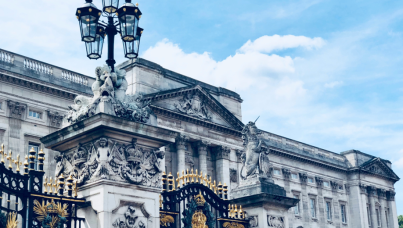The Power of Public Opinion: Princess Diana: 1961-1997
- Introduction
- The role of the media
- The power of public opinion
- Public Opinion Polls
- The Royal Family
- Princess Diana
- Implications
- Conclusion
- References
Introduction
The power of public opinion was vividly demonstrated recently in Britain by an event which grabbed the attention of the entire world. Princess Diana, an icon of our time with probably the highest awareness level of anyone in the world, was killed in a car crash and at the age of 36, struck down in the prime of life. Her life was measured in the thousands of extra copies of magazines and newspapers in every language published, when she was the cover picture. Her death became a world-wide public event, with millions who had never met her feeling a personal bereavement.
Tony Blair spoke for the country when he described Diana as the 'People's Princess'. A MORI poll carried out for The Times in August had showed his Prime Ministerial satisfaction rating at 66%. During the week after her death, before the funeral, a MORI poll for ABC News that 74% of the British had a favourable opinion of him, with only 14% unfavourable, putting him just below the Anne, The Princess Royal, (76% favourable/12% unfavourable) in public esteem (and this was confirmed by the September poll for The Times recording a 75% satisfaction rating for Blair). A net favourability rating of +60 put Blair well ahead of the Queen's rating of +30, and in a different league altogether than Prince Charles' -5 and the Tory Leader of the Opposition's -18.
Led by the anti-monarchist press, the media took up their role as public spokesmen to criticise the Royal Family generally and the Queen specifically for not speaking out of their sorrow in losing the woman whom Charles had divorced and whose Royal standing had been removed by the Queen herself. Leader pages and news stories were critical of the Royal Family's failure to been seen and heard. Vox pops were sought to let ordinary people 'speak for public opinion' on the reticence of the Royal Family generally, and the failure of the Queen specifically, to speak to the nation. Yet no poll was commissioned by the British media that week to obtain a systematic and objective measure of the public mood. Only an American TV network, ABC News, sought polling data from the British people.
It took from Sunday's brief Palace announcement of regret until Friday, the eve of the funeral itself, for the Royal Family to respond to public pressure to demonstrate their sympathy, the Duke, Prince and the two sons of the Princess in a walkabout in London on Friday afternoon, the Queen in a personal message broadcast on radio to the nation on the Friday evening .
The nation mourned their Princess. It became infra dig to recall any negative characteristics of the late Princess. There was a 'spiral of silence'. Those who knew her were pumped for anecdotes, but defence of the Royal Family's privacy fell on deaf media ears, and more than one invitation to take part in the rolling media coverage was withdrawn when it was found that the speaker thought the Royals' behaviour defensible or the late Princess's life anything less than spotless. People were heard incessantly on the radio and television, and quoted in the newspapers. Virtually no media report was complete without a vox pop from the crowds lined up day and night to sign the book of condolence opened at St. James's Palace.
The role of the media
For a full week, this single news story dominated all media outlets to an extent that is rarely seen under any circumstances. Diana's death received more media attention than any event in history. It was the biggest story the BBC had ever carried, if resources thrown at it are a good measure. The funeral coverage was the biggest ever broadcast operation, involving 100 cameras, 300 technicians and 22 outside broadcast units in London alone. Their reports and commentary on the proceedings were carried simultaneously by BBC Radio and TV in Britain and BBC World Television broadcast it to 187 countries in 44 languages. An early estimate was that 40 million of the 60 million adults in Britain watched the procession (later amended to 32 million) as did an estimated 2.5 billion viewers around the world. (The previous biggest worldwide TV audience was an estimated two billion for the World Cup Final between Brazil and Italy in 1994.) The press followed suit: analysis by Durrant's shows that in column inches the story eclipsed any since the start of the Second World War , even including the assassination of Kennedy. (Watson-Smyth 1997).
And, for the most part, the subject of the story was public opinion -- reaction to Diana's death, attitudes towards the media and paparazzi and the apportionment of blame, attitudes to the Royal Family's reactions and the changing position in which this put the institution of the monarchy in public regard, and above all an apparent overwhelming tide of emotion and outpouring of collective grief.
Yet not a single poll was conducted to find out the real depth of feeling, the balance, the objective and systematic measure of the mood of the nation, until American Broadcasting Company's ABC News rang mid week to commission a poll to go out on their network the eve of the funeral, Friday evening. Despite an alert from the Press Association and copies of the ABC Polling Unit's news release and copies of the poll top-line being sent to British media, hardly a line was printed in the weekend papers in Britain. Was it irresponsible to ask the public how they felt? Was it unseemly to intrude on their grief? Or was it something that might get in the way of a good story?
It is the media who filter, and therefore speak for, public opinion, as they see their role and as many others see it as well. If the Director General of the BBC decides that a programme shall, or not, be broadcast, it will be, or will not. And to a surprising degree, where the BBC leads, the rest of the British media follow. In The Times (10 September 1997), Tony Hall, Chief Executive of BBC News, stated his surprise with the phenomena of public reaction to the death: 'The real story was outside the studio, on the streets ... Audiences are supposed to be listening to us, not the other way around', he wailed. 'The media did not understand her significance to people. Why should we', he asked plaintively. 'We were following the story, not making it.' So now we know what the BBC has seen as its role, and what a shock to the system the public has given the voice of the British establishment, the BBC. Finally, 'It seems that Diana made a connection with people, that very thing we use focus groups to help us achieve' (sic).
Following the 1992 British General Election, the Director General and his then head of research wrote draconian guidelines, some even mistaken in their knowledge of the field, which led to censorship of poll findings and curtailment of commissioning of public opinion polls. He said a month before the election: 'I hope the polls get it right this time, so we can go back to reporting them properly'. Much continued and continues to be spent by the BBC on researching audience preferences satisfaction and of staff attitudes, but few polls of the public mood are conducted, much less broadcast, and during the last election, hardly any broadcast without the drip, drip, drip of so-called 'health warnings' that polls are often wrong, should be taken with a pinch of salt, are only a snapshot, are limited in their value, etc.
No one at the BBC rang for any MORI poll data either before or after the Press Association alert that MORI had done a poll, made contact to see if any poll data existed, tapped into the MORI Web site to take off the freely available poll findings, or commissioned any poll to tap into the public's mood. Why not?. The American people were given a measure of British public opinion via the ABC News/MORI findings; for that matter they were broadcast and reported as far away as Brazil and Chile. But no coverage in Britain.
Daniel Yankelovich in his 1995 Dinerman Award lecture observed that 'polls have grown ever more misleading. Far from giving leaders insight into the real concerns of the public, they often add to the disconnect that separates the leadership class in the United States from the mainstream of the citizenry'. (Yankelovich, 1996)
I said in my Dinerman address a year later, when as distinguished a figure as Yankelovich says polls are misleading, we have to re-examine what it is we are doing and why we do it. But I also observed, 'The role of the modern newspaper, radio and television is to let the reader, the listener and the viewer know what is happening in the world in which they live ... it is the role of the media to communicate a better understanding to the elite, the opinion former, the politician, the pundit and the commentator of what is happening, so that they will be better informed and thereby be in a better position to play their own role in the process of diffusion of information to the public and to each other.' (Worcester, 1997).
The power of public opinion
Necker, minister of finance in pre-Revolutionary France, noted in 1792 'Only fools, pure theorists, or apprentices fail to take public opinion into account' (Palmer, 1936), yet seemingly, the battle raged within the Palace between the traditionalists and modernisers as to how to handle the many decisions of protocol and procedure surrounding the funeral.
The perceptive Henry Luce III, then bureau chief at Time Magazine in London, wrote an article nearly thirty years ago entitled Monarchy: the vital strand' (Luce, 1969). in the book The Monarchy and its Future , edited by Jeremy Murray Brown. Using poll evidence in the way of American, if not British, senior journalists, he observed that 'According to opinion polls, it appears that about 72 percent of the British people think that the monarchy possesses some element of real and active political power. They are wrong ... . But most startling to an American visitor is the discovery that about a sixth of the British people think they would like to see the monarchy abolished.'
Over the last few years MORI has also found that about one in six of the British, or even one in seven or eight, have thought that the country would be better off without a Royal Family. In 1984, the first time the British were asked that particular question formation, including the relevant 'would make no difference' option, only one in twenty who thought the country would be better off without the monarchy. More recently, it has hovered around 18%.
Luce described the Monarchy as irreplaceable without trauma, uniquely suited to the British character, and the 'legitimising authority ... of the nationhood ... the fundamental cement.' Yet he observed that the Monarchy 'is the most delicate flower of its sceptre isle. The weaknesses of the Monarchy are not of what it is, but of what it does; most of the serious criticism which is made of it in Britain is of its behaviour, not of its condition. The crown speaks -- and offends. Or it does not speak -- and is remote. The crown sticks to channels and protocol -- and seems stuffy. Or it reaches out to the people -- and makes enemies.' No truer than the week following the Princess's death, when nothing the Royal Family could do seemed to satisfy its critics.
Luce's prescription for the Palace was that in the education of its children, the Royal Family should leave more to chance, balancing mystery with relevance. It should set an example, but not fashion. He concluded that 'The British people have in their monarchy a prize possession, which they must nourish carefully in order to keep it strong ... The monarchy will inevitable change with the times, but the trick for all concerned will be to know which direction it should take, and to help it on its way.'
But, increasingly, there is a mood that says it is possible, permissible even, to be critical of the Royal Family, who have made themselves fair game, and even the Queen herself. Polls came to Britain in the late thirties; it was not until the fifties (and worries about public reaction to Princess Margaret's love for Group Captain Townsend) that the public were even asked questions about how they felt about things Royal; before that, it was a no-go area. . But in the modern world, the Royal Family need to understand public opinion, because the monarchy is no longer above or beyond it. As Aristotle noted, "He who loses the support of the people is a king no longer".
Public Opinion Polls
What are the public polls for? As in the case of the media, to inform, to entertain, and to educate. The role of the modern newspaper, radio and television is to let the reader, the listener and the viewer know what is happening in the world in which they live.
That is their public mission. As a by-product mainly, but occasionally specifically, it is the role of the media to communicate a better understanding to the elite, the opinion former, the politician, the pundit and the commentator of what is happening, so that they will be better informed and thereby be in a better position to play their own role in the process of diffusion of information to the public and to each other.
Opinion formers are widely read and informed, or at least they should be. They know that they must follow the detail of the news, read the leader pages and editorial comment in the heavyweight newspapers as well as the news stories, watch other opinion formers debate and discuss current affairs in order that when their turn comes, they will appear informed themselves and thereby enhance their own status as informed, educated and influential.
Information diffusion is a complex process in the electronic age. Opinion poll results are, or should be, a help to the public's and the opinion formers' understanding of this process, offering, as they do, one of the few systematic and objective parts of the information flow.
Butler and Rose (1959) concluded almost forty years ago:
"What is also needed is a higher degree of education about the limitations and possibilities of the polls and perhaps more information and humility from some of their sponsors. The first thing that has to be learnt is that their main value does not lie primarily in election prediction. The sampling of opinion can yield a vast amount of information of the greatest political and social importance ... Polls can reveal how well informed the public is about any issue and whether it has strong views; they can also reveal what people do and what media of communication they are exposed to. There has never been anything comparable to sample polls as a tool for advancing understanding of mass political behaviour."
Yet for the week of mourning, little use was made of public opinion research by the media to assist them in their understanding of the public mood, surprised as everyone in the 'chattering classes' were by the outpouring of the public's expression of their grief in the death of their Princess. Why?
The Royal Family
'Students of great public relations disasters will pore over the performance of the Royal Family at Balmoral last Sunday [the day of the announcement of Diana's death]', was the conclusion of Chris Blackhurst, writing in the Independent on Sunday, a paper noted for being the first to call for the abolition of the Monarchy.
As shown on the graph below (Figure 1), there had been a steady decline in the support for the Monarchy over the decade, yet seemingly the tide had turned, and there was a faltering in the trend, a change of mood, a resurgence of support among the public of Great Britain, until the Event, yet a sharp recovery, after the Royal Family responded to the public mood.
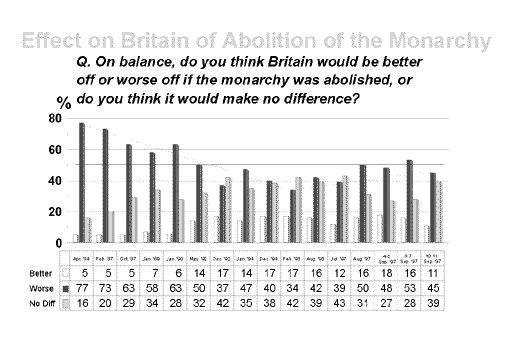
Figure 1: Base: c. 1,000 British adults Source: MORI
Recovery notwithstanding, there are still more of the British who are sceptical of the future of the Monarchy than optimistic. While 58% more people expected the Monarchy to survive for at least fifty years than expected it not to in 1990. In the aftermath of the death of the Princess, those who thought it would not survive so long outnumbered those who thought it would by 15%.
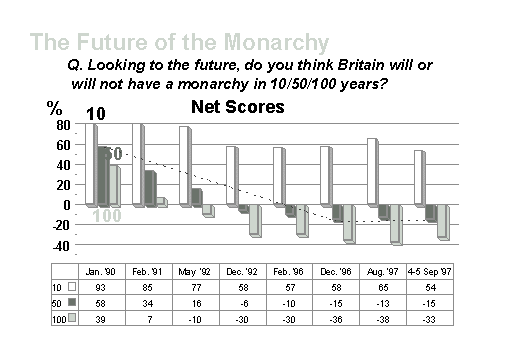
Figure 2 Base: c. 1,000 British adults Source: MORI
When MORI first began its trends on public expectation of Charles as King in 1984, overwhelming numbers of his subjects in waiting had a high expectations of him as King. (Figure 3) His 40 point drop in public confidence between 1991 and 1997 is one of the biggest declines every measured by MORI. And it hasn't improved much recently.
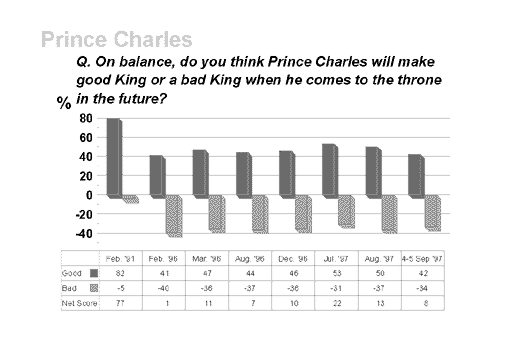
Figure 3 Base: c. 1,000 British adults Source: MORI
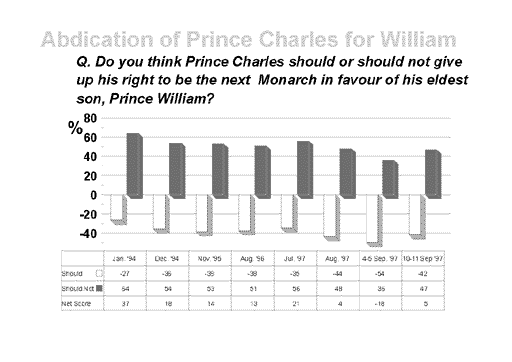
Figure 4 Base: c. 1,000 British adults Source: MORI
As public dissatisfaction with Prince Charles has declined and his elder son, Prince William has matured, the public has been split on whether they would prefer to see William as their King, rather than his father; indeed, in the week before the funeral a majority said they wanted Prince Charles to stand down. (Figure 4) Still a majority of the public wish the Queen to continue to reign, despite her recent decline in popularity: A few days after the funeral (10-11 September), 65% thought she should stay Queen as long as possible and only 27% that she should abdicate at some stage. Asked another way immediately after the funeral, there was somewhat more support for her abdicating, so long as she did so in William's favour rather than Charles's, but a majority still preferred her to remain on the throne. (Figure 5) This brings into question the interpretation of the journalists on the Sunday Times (7 September) who wrote up the findings of an NOP poll reporting , that a majority wish to see her stand down soon.
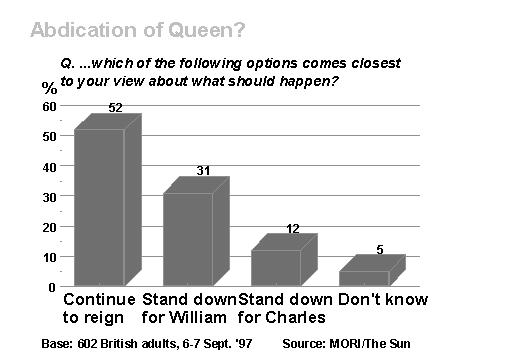
Figure 5
A decade ago, the Princess Royal, Princess Anne was one of the least popular members of the Royal Family, and since has gone through divorce and remarriage. Yet today she is the most popular of the Royals tested (the ever popular Queen Mother was not included in the question), showing that by doing good works, and keeping her head down, the Princess Royal has been able to rise in public esteem. This example will not have gone unnoticed by other members of the Royal Family. Before the death of Princess Diana, it might have been expected that the Queen would have topped the poll, perhaps just after the Queen Mother as she has in the past, but at the time the poll was taken, there were many who expressed their disappointment in her.
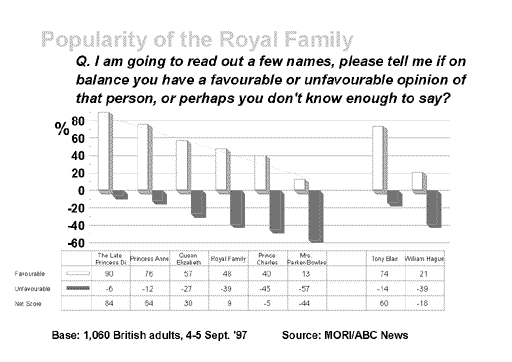
Figure 6
On the Wednesday and Thursday following the death of the Princess, but before the 'going public' of the Royal Family by walkabout and by broadcast, they stood on the brink of the abyss, looking down at the chasm of public opinion, fanned by a media that included newspapers which either overtly or covertly favoured the abolition of the Monarchy. The impact of the events that week took its toll. Nearly one person in four in the poll for ABC News, taken on the Wednesday and Thursday following the accident, said they thought the Monarchy should be abolished; asked by MORI in many different ways over the past two decades, the figure had never before risen above 20%. Still, over six in ten, 63%, supported its continuance, even when asked if it should continue as is, even though we know from a later question that many people would prefer the Monarchy to be kept, but its style changed (Figure 7). But asked more starkly, following the intervention of the Queen and her Family, the figures shift back into the usual pattern of one in six who favour abolition of their status in the British constitutional scene (Figure 8).
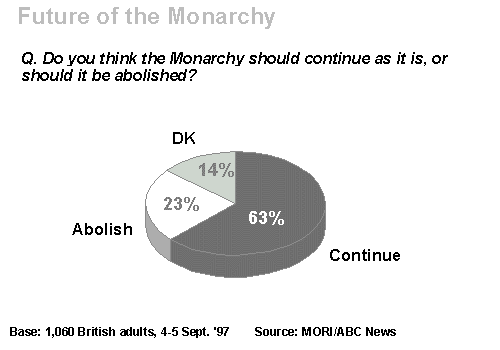
Figure 7
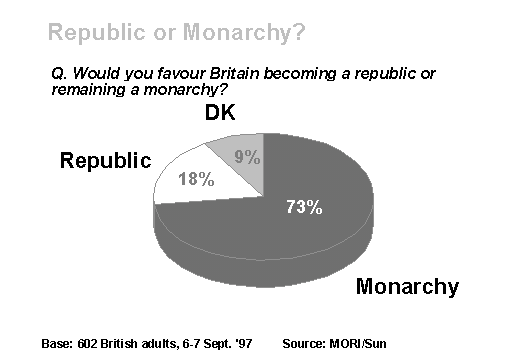
Figure 8
The profile of abolitionists is surprisingly not skewed by gender. Although it is clear from many polls in the past and from observation of behaviour that women tend to be more interested in the Royal Family, from everything to readership studies to the ICM findings in the Observer the following Sunday which showed that among those queuing outside the Palace women outnumbered men by nearly five to one (and tended more to be Mail readers than Sun readers, even though the Sun outsells the Mail by nearly two to one), the 18% who say they would favour Britain becoming a republic are split evenly, half men and half women.
Where the split comes, is by age, the third of the adult population over 55 being much less likely to favour Britain becoming a republic than those under 55. While two in ten of those under 55 would favour a republican Britain, only one in ten of older people would agree. And with the country now about evenly split between working-class and middle-class people, defined by their occupational status, republicans tend more to be middle-class.
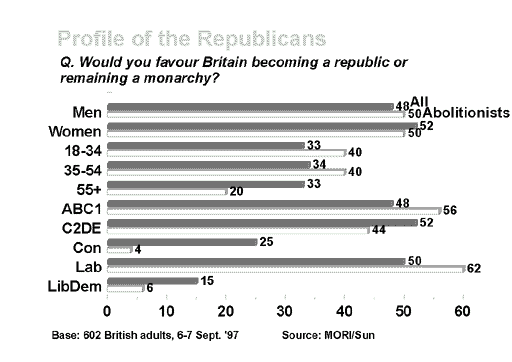
Figure 9
Support for the continuance of the Monarchy becomes even stronger if the Queen, now 72, and her son and heir Prince Charles, were to decide that the Crown should, in due course, go directly to the older son of Prince Charles and Princess Diana, with only 11% opting for republicanism.
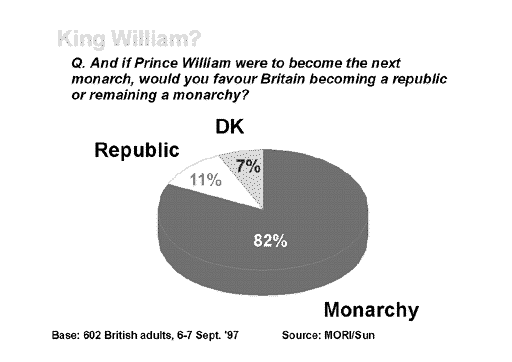
Figure 10
Princess Diana
There are many aspects of the remarkable situation following the death of the Princess that impacted on her former husband Prince Charles, the Queen and the rest of the Royal Family, and even the Government and the Opposition. Generally speaking, the Government came out of it very well, and the Prime Minister was thought by most commentators and by the public to have handled himself brilliantly, while many were critical of the Royal Family, both in their handling of the divorce between Prince Charles and Princess Diana, and in the week following her death, before their public intervention.
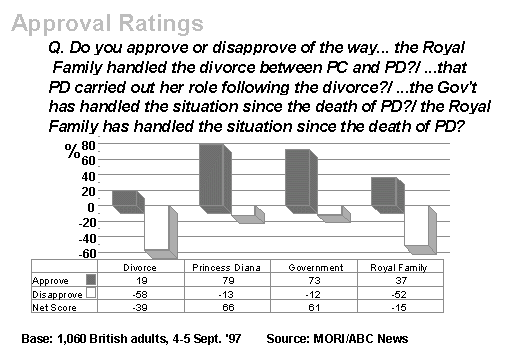
Figure 11
The outpouring of support and sympathy for the Princess was a social phenomenon which was written about by nearly every commentator and pundit in Britain, and even throughout the world. Certainly the French and German press were obsessed by the public demonstrations in London as hundreds of thousands queued for hours, some for days, to sign the book of condolence for Princess Diana set out at St. James's Palace first and then elsewhere, from Britain's stately Cathedrals to Tesco supermarkets. A remarkable 10+ million people said they had signed by the weekend of the funeral, and an even more remarkable nearly 10 million said they planned to, and one person in six said they had left flowers to express their sorrow at the death of the Princess.
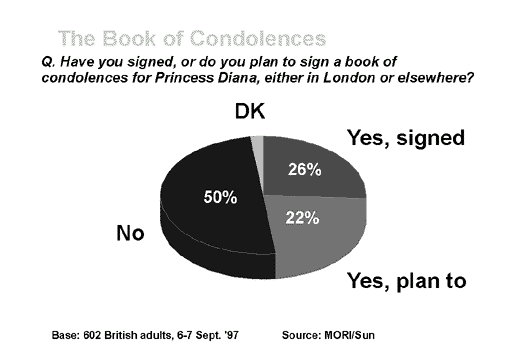
Figure 12
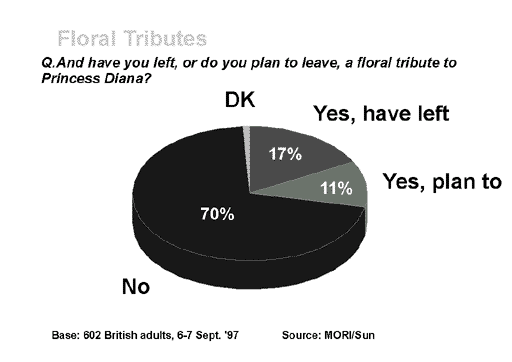
Figure 13
And finally, the lessons for the Royal Family and for others touched by the death of the Princess. When asked to choose between the Royal Family has acted in the past, and contrasted with the way that the Princess led her life, at the apex of feeling of regret, remorse and among many, despair, a remarkable two-thirds of the British public stated their belief that the Royal Family must change, and conduct themselves in the future more in the way that she did, rather than the more conservative, more dignified, more reserved manner of Royalty. She was seen as Royalty in her dealing with children, with old people, with those suffering with the loss of limbs from landmines or threatened with the loss of their lives through AIDS. Her status as the Royal Princess as well as her beauty and charm (few who met her were not stunned by the warmth of her smile, the sparkle of her eyes, the attention she paid to your words), conveyed an interest in people that the Royal Family seems unable or unwilling to emulate, and on this level she set a high standard. Yet in her other behaviour, she was shown to be wilful, petulant, devious and headstrong, but these are traits she will not be remembered for, at least by most people.
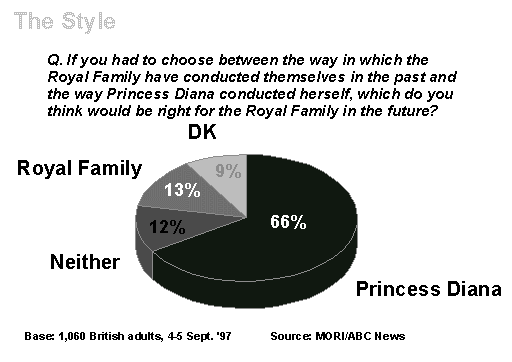
Figure 14
Implications
For the Royal Family
What happened in the aftermath of the tragic death of the Princess clearly shows that the Royal Family must listen, and listen hard to public opinion, for the public reaction to the death of the Princess is no less a warning than the polls and Wirral South by-election result was to the last Tory Government, and they failed to heed the message to their massive defeat at the polls on May 1st. John Major and his Government took the British public for granted, believing in economic determinism and that by having inflation under control and unemployment falling they would be rewarded by a grateful public by being returned a fourth time to Government. The public gave them a shock on May 1st, that was a warning to all in public life that the days of public obedience are over, and that the public wishes for their voice to be heard, and when given the chance, will demand it.
For the Government
If this Labour Government continues to judge the public mood with the deftness shown during the week following the death of the Princess, and Prime Minister Tony Blair continues to speak for the nation with the clarity shown during that time, then 'Tony's Army' should continue to occupy the seat of power in this country for many years to come. He has a feel for how to handle public opinion in a way many politicians would give their birthright for, yet few possess. He is setting new highs for satisfaction ratings, even among those supporting other political parties, and although he has his critics in his Party, among the 'Old Labour' MPs, they have little support in public opinion. As for the Leader of the Opposition, his partisan voice seems to have drawn fire from all quarters, including Members of his own Cabinet. With 22% favourable to him, and 39% unfavourable, he has a long and hard road ahead to win back a place for himself, even without having to face such a formidable opponent as Tony Blair.
For the Media
The media of Great Britain must heed the warnings manifest in the finding that 91% of the public would favour a strengthening of the privacy laws to help people being followed and photographed against their will, and only 6% say they would not favour such restrictions. The press should curb the tendency to put all aside except getting the story and especially the picture; competitive pressures have led to journalistic excess, and public cynicism is growing and the esteem with which journalists are held are lower even than that of politicians, and much lower than that of the Royal Family. Just as politicians and the Royals must learn to listen more to the rumblings of the body politic, so must the media, in all its forms.
For the Polls
During the first week or two following the death of the Princess, the British pollsters were marginalised, ignored, in spite of the acres of newsprint devoted to journalists trying to understand the public mood, few in Britain sought understanding through poll findings. Yet the American and Canadian quality newspapers and news magazines were attempting to find out what people were really thinking and how they were reacting. Only the Observer, led by their poll expert Peter Kellner ,commissioned a poll on the public mood, and that only a few hundred in the throngs in London on the day before the funeral. This was followed, but only by a day, the Sun, who commissioned MORI to follow up on its poll for ABC News to ascertain the public mood, and then by the Telegraph, with Gallup, a few days later. It wasn't until two weeks after the death of the Princess that the Sunday Times published its NOP poll, and the Observer a poll of the national mood by ICM. Why are the British media so hubristic as to think that they have a monopoly on understanding public opinion, and they don't need to employ the systematic and objective skills that pollsters can bring to bear to help in the understanding of public opinion? In the week following the death, I was invited to appear on American television by NBC, CBS, ABC and CNN, the four principal networks, but not by either the BBC or ITN; interviewed, in some cases more than once, by the Washington Post, Newsweek and Time, but not by The Times, the Independent, the Guardian or FT, nor was, to my knowledge, any other person whose life is devoted to the study of British public opinion using the best tools every invented for the study of public opinion. What does this say about the British media and its relationship and understanding of what it is that we do and why we do it?
Conclusion
Opinion polling is widely misunderstood. It is the only means by which, systematically and objectively, public opinion can be assessed. Vox pops and focus groups, telephone phone-in 'voodoo polls' are no substitute. Only quantitative, properly sampled surveys can accurately assess public opinion. Only polls can provide an accurate, trendable, measure, analysis and tracking of the behaviour, knowledge, opinions, attitudes and values of the public. By doing this, within the limits of the science of sampling and the art of asking questions, surveys can determine what people do and what they think. Via the media, polls can then be used to inform others of this information, for their own use in what ever way those who receive this information may wish to use it. Following the death of Princess Diana, public opinion was the main news story for over a week, yet during that week the British media completely failed to use polls as a tool in reporting it.
Opinion polls have no axe to grind, no incentive to manipulate. They are there not to persuade a person to act in one way or another, to think or vote in a certain way, to buy particular newspapers or to watch particular TV programmes. They are there to provide information about what others think. Politicians and some newspaper proprietors and editors are guided by their own desire to see a certain election outcome, some policy change, some 'spin'. Opinion polls are not and do not, and there is no incentive for them to be otherwise.
Sir Robert Worcester is Chairman of MORI International, based in London, and is a Governor of and Visiting Professor of Government at the London School of Economics and Political Science and in the Graduate Centre of Journalism at City University, London, as well as Visiting Professor of Marketing at the University of Strathclyde, Scotland. He is a Past President of the World Association of Public Opinion Research and is an Editor of the International Journal of Public Opinion Research. He is a Fellow of the MRS.
This paper was adapted from a presentation given originally to the 50th Anniversary Conference of WAPOR (World Association of Public Opinion Research) in Edinburgh on 11 September 1997.
REFERENCES
- Blackhurst, Chris. (7 September 1997). 'Hard lessons for the Firm', Independent on Sunday.
- Butler, David, and Rose, Richard (1959). The British General Election of 1959. Macmillan.
- Hall, Tony (10 September 1997). Article in The Times.
- Luce, Henry III (1969). ' Monarchy: The Vital Strand' in Murray-Brown, Jeremy, The Monarchy and its future. George Allen & Unwin Palmer (1936)
- Watson-Smyth, Kate (1 October 1997). 'TV newsreader in scandal over comments on Diana', The Independent.
- Worcester, Robert M. (1997) 'Why do we do what we do?' , International Journal of Public Opinion Research, 9,1, pp 2-16.
- Yankelovitch, Daniel. (1996) 'A New Direction for Survey Research' , International Journal of Public Opinion Research, 8,1, pp 1-10.


